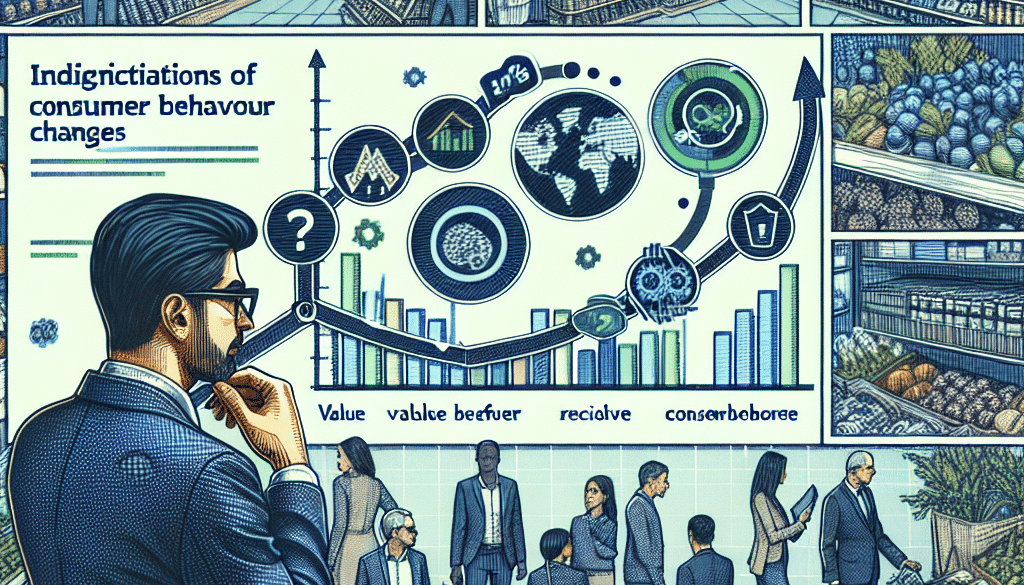Innovating for Recession-era Changes in Consumer Behaviour
-
Table of Contents
- Innovating for Recession-Era Changes in Consumer Behavior
- Understanding Recession-Impacted Consumer Behavior
- Innovative Strategies for Adapting to New Consumer Trends
- Value-Oriented Product Offerings
- Enhanced Customer Experience
- Investment in Technology and E-commerce
- Flexible Payment Solutions
- Sustainability and Ethical Practices
- Case Studies: Success Stories During Economic Downturns
- Statistics and Research on Recession Behaviors
- Conclusion: Key Takeaways for Businesses
- ETprotein: Meeting the Demand for High-Quality Protein Products
Innovating for Recession-Era Changes in Consumer Behavior

Recessions are a challenging time for both consumers and businesses. Economic downturns lead to changes in consumer behavior, as individuals become more cautious with their spending, seeking greater value and efficiency in their purchases. For businesses, this shift necessitates innovation and adaptation to remain competitive and relevant. This article explores how companies can innovate to align with recession-era changes in consumer behavior, offering insights and strategies to thrive in challenging economic times.
Understanding Recession-Impacted Consumer Behavior
During a recession, consumers typically adjust their spending habits in several key ways:
- Increased Price Sensitivity: Consumers become more price-conscious, looking for discounts, deals, and better value for money.
- Shift to Essentials: Spending on non-essential items declines as consumers prioritize basic needs and necessities.
- Preference for Durability: There is a greater emphasis on products that offer longevity and reduce the need for frequent replacement.
- Desire for Flexibility: Flexible payment options and return policies become more attractive as financial uncertainty looms.
- Increased Online Shopping: Economic downturns often accelerate the shift to e-commerce as consumers seek convenience and lower prices.
Innovative Strategies for Adapting to New Consumer Trends
Businesses can employ several innovative strategies to adapt to the recession-induced changes in consumer behavior:
Value-Oriented Product Offerings
Companies can develop products that emphasize value without compromising on quality. This could involve creating budget-friendly product lines or bundling products to offer better deals. For example, during the 2008 recession, McDonald’s focused on its Dollar Menu to cater to budget-conscious consumers, which helped the company maintain strong sales.
Enhanced Customer Experience
Improving the customer experience can differentiate a brand during tough economic times. This might include personalized services, loyalty programs, or exceptional after-sales support. Amazon’s relentless focus on customer service, including easy returns and fast shipping, has made it a go-to retailer regardless of the economic climate.
Investment in Technology and E-commerce
With the rise of online shopping, investing in a robust e-commerce platform is crucial. Companies like Nike have successfully leveraged digital sales channels, using apps and online customization tools to engage consumers directly.
Flexible Payment Solutions
Offering flexible payment options such as buy now, pay later services can attract consumers who are managing tight budgets. Klarna and Afterpay are examples of fintech companies that have grown rapidly by providing flexible payment solutions to both consumers and retailers.
Sustainability and Ethical Practices
Even in a recession, many consumers remain committed to sustainability and ethical consumption. Brands that maintain environmentally friendly practices and ethical sourcing can appeal to this consumer segment. Patagonia’s commitment to sustainability has helped it maintain a loyal customer base through various economic cycles.
Case Studies: Success Stories During Economic Downturns
Several companies have successfully navigated recessions by understanding and adapting to changes in consumer behavior:
- Netflix: During the 2008 recession, Netflix shifted from DVD rentals to streaming, capitalizing on the consumer trend towards more affordable home entertainment options.
- Hyundai: Hyundai’s “Assurance Program,” which allowed customers to return their cars if they lost their jobs, addressed consumer fears during the recession and boosted sales.
- Lego: Despite the 2008 downturn, Lego invested in product innovation and marketing, leading to a significant increase in sales as families sought value in long-lasting, creative play options.
Statistics and Research on Recession Behaviors
Research shows that consumer behavior shifts significantly during recessions. According to a McKinsey report, 40% of consumers become more mindful of where they spend their money during economic downturns. Additionally, a study by the Harvard Business Review found that companies that focus on operational efficiency and invest in market development during recessions outperform their peers.
Conclusion: Key Takeaways for Businesses
To thrive during a recession, businesses must:
- Understand the changes in consumer behavior and adapt their offerings accordingly.
- Focus on value, customer experience, and flexibility to meet the needs of price-sensitive consumers.
- Invest in technology and e-commerce to capture the growing online market.
- Maintain a commitment to sustainability and ethical practices, which remain important to many consumers.
- Look to successful case studies for inspiration and guidance on navigating economic downturns.
Innovating for recession-era changes in consumer behavior is not just about survival; it’s an opportunity to strengthen the brand, build customer loyalty, and position the company for growth when the economy rebounds.
ETprotein: Meeting the Demand for High-Quality Protein Products
In light of the recession-era focus on health and value, ETprotein’s range of organic bulk vegan proteins and L-(+)-Ergothioneine (EGT) products are well-positioned to meet consumer needs. Their non-GMO, allergen-free proteins cater to the growing demand for sustainable and ethical nutrition options. With a commitment to quality and customer service, ETprotein is an ideal partner for businesses looking to innovate in the health and wellness space during challenging economic times.
About ETprotein:
ETprotein, a reputable protein and L-(+)-Ergothioneine (EGT) Chinese factory manufacturer and supplier, is renowned for producing, stocking, exporting, and delivering the highest quality organic bulk vegan proteins and L-(+)-Ergothioneine. They include Organic rice protein, clear rice protein, pea protein, clear pea protein, watermelon seed protein, pumpkin seed protein, sunflower seed protein, mung bean protein, peanut protein, and L-(+)-Ergothioneine EGT Pharmaceutical grade, L-(+)-Ergothioneine EGT food grade, L-(+)-Ergothioneine EGT cosmetic grade, L-(+)-Ergothioneine EGT reference grade and L-(+)-Ergothioneine EGT standard. Their offerings, characterized by a neutral taste, non-GMO, allergen-free attributes, with L-(+)-Ergothioneine purity over 98%, 99%, cater to a diverse range of industries. They serve nutraceutical, pharmaceutical, cosmeceutical, veterinary, as well as food and beverage finished product distributors, traders, and manufacturers across Europe, USA, Canada, Australia, Thailand, Japan, Korea, Brazil, and Chile, among others.
ETprotein specialization includes exporting and delivering tailor-made protein powder and finished nutritional supplements. Their extensive product range covers sectors like Food and Beverage, Sports Nutrition, Weight Management, Dietary Supplements, Health and Wellness Products, and Infant Formula, ensuring comprehensive solutions to meet all your protein needs.
As a trusted company by leading global food and beverage brands and Fortune 500 companies, ETprotein reinforces China’s reputation in the global arena. For more information or to sample their products, please contact them and email sales(at)ETprotein.com today.














